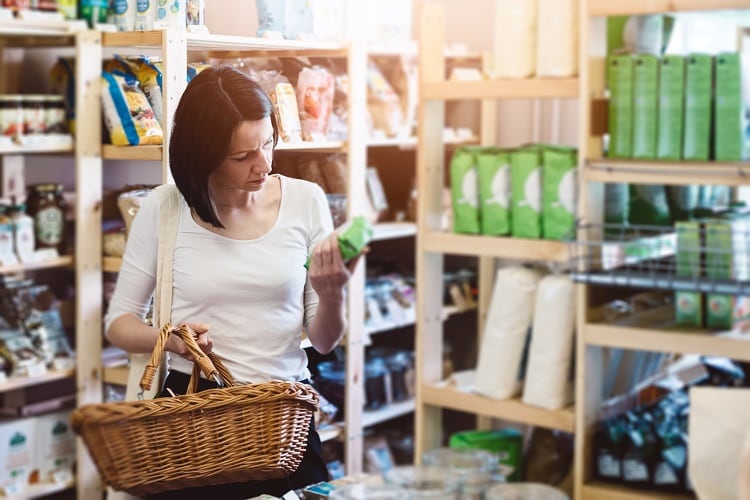Environmental labelling of food and drink products is ‘essential in helping consumers make more informed choices, as well as producers who are given the information they need to innovate in a more sustainable way’.
That’s according to Foundation Earth, which formed last year with the aim of rolling out a Europe-wide eco-label scheme by the Autumn of 2022. The organisation has received the backing of global food and drink giants Nestlé, Tyson Foods, PepsiCo, Danone, Starbucks, Co-op, Sainsbury’s and M&S.
But Foundation Earth’s plans are being hindered by what it calls “a proliferation and disparities between existing methods and labels”.
It’s estimated there are over 120 different types of front-of-pack labels in use on food and drink products globally, all offering to provide shoppers with greater information about the environmental footprint of food.
On top of Foundation Earth, there is Eco-Score, (courted by big names in European retail such as Colruyt and Lidl) and Planet-Score in France. Four of the UK's biggest retailers, Co-op, Morrisons, Sainsbury’s and Tesco, will also trial this summer a new environmental labelling system unveiled by grocery-research body IGD.
Individual countries are eyeing their own eco-labels too. For example, Denmark is investing DKK 9m (€1.2m) in the development of a government-run climate label for food.
What's more, at present the eco-labels all measure slightly different things in slightly different ways. For example, all are based on lifecycle analysis (LCA) methodology, but this can be sourced from diffent data sets. Planet-Score, meanwhile, is keen to go beyond LCA methodology and address other factors such as pesticide use, climate impact, biodiversity and animal welfare on its labels.
Different methodolgies are confusing consumers and producers
But according to Foundation Earth, this flood of groups using using differeent methods when calculating the climate impact of a product “risks leading to more confusion among consumers and industry players”.
It is therefore calling on all the different eco-labels to agree a harmonised approach to be rolled out in the EU and UK. The European Commission has, for instance, said it plans to propose a standardised methodology.
Foundation Earth has formed what it calls a ‘heavyweight’ political and scientific coalition to set out the key principles for a future eco-labelling scheme for food and drink.
The group comprises senior politicians from six countries, a number of Europe’s leading food and environmental scientists, the UN’s climate change body and three influential EU-backed food and climate change initiatives.
In a letter to the European Commission and the UK Government, the coalition “calls on all stakeholders to engage openly, inclusively and collaboratively to find the optimised and harmonised solution we crave”.
It says that an optimum environmental labelling scheme for food and drink should:
- be governed by an independent organisation,
- be harmonised across the continent of Europe,
- build upon the European Union’s Product Environmental Footprint,
- be based upon the foundations of life cycle assessment,
- use as much primary data as possible,
- allow products to be compared based upon credible and robust product-specific data.
The letter stated: “As the future of environmental labelling for food and drink continues to take shape, it is vital that any eventual scoring and labelling scheme is governed by an independent organisation and harmonised across the continent of Europe, building upon the European Union’s Product Environmental Footprint.
“Environmental labelling of food should also be based upon the foundations of life cycle assessment, use as much primary data as possible, and allow products to be compared based upon credible and robust product-specific data.
“It is encouraging that technical solutions will soon be available to make such a system a reality and that research is already being compiled on how consumer behaviour can be affected by environmental scoring.
“Any environmental labelling system that falls short on these core principles not only risks failing to gain the trust of consumers, but would not provide food and drink producers with the product level information they require to introduce sustainable innovations through their supply chains.
“It is these small changes - when added together in their millions - that will go the furthest in reducing the industry’s environmental impacts.”
In a separate public letter addressed to the other leading labelling schemes, Foundation Earth chief executive Cliona Howie warned that “future generations will not forgive us if we squander this chance” to come together.
Howie wrote: “The deployment of multiple schemes, several different label designs and various contrasting methods risks undoing all of our good work. If we fail to come together, we run the real risk of grabbing defeat from the jaws of victory. We will confuse consumers, add costs to producers and retailers and fail to seize the potential of multiplying our efforts and combining our expertise.
“Most of all, we risk losing the trust and goodwill of the citizens for whose engagement and understanding our mission depends.”
An eco-label summit
Foundation Earth has called a summit in Brussels for September, to be hosted by EIT Food and independently chaired by its chief executive Andy Zynga. EIT Food is the European Union’s food innovation initiative.
Those invited from other environmental label scores include representatives from Ecoscore, Planet-Score and IGD.
In her letter to the other organisations, Howie wrote: “This is our opportunity to put commercial pressure and national politics to one side and instead come together to deliver the change we all want to see. It is within our grasp to do something extraordinary. Future generations will not forgive us if we squander this chance.”
'It is not about who wins'
The summit will be the first of its kind, said Foundation Earth, and has been called in order to explore how the different initiatives can come together to deliver an optimum labelling scheme better and faster – and avoiding unnecessary proliferation.
“The ambition is therefore to build a harmonised approach, which means one method and one label deployed at scale across the continent, adhering to the key principles set out in the joint letter,” a Foundation Earth spokesperson elaborated to FoodNavigator.
The spokesperson stressed the point of the summit is not an attempt by Foundation Earth to become the dominant label in Europe, but for for all the different labels to agree to use the same methodology.
“It is not about whether FE, IGD, Planet or Eco ‘win’ or become the dominate label, it is about us all working together instead of competing, taking on each other’s expertise and agreeing on a harmonised and unified way forward that is delivered better and faster together than it could be alone,” the spokesperson said.
“We are not precious whether FE becomes the dominate initiative or not. We are only firm on the key principles of the future optimum scheme and we want to work with the others to ensure they are delivered - so consumers get the clear info they crave and the industry gets the info it needs to innovate in a more sustainable way. It is no more complicated than that.
“Everyone loses if there are multiple labels and multiple methods. We do not affect the change we want to see - as it will not enable us to build a more sustainable food and drink industry. The aim of the summit is to avoid this by bringing together the leading initiatives under one roof.”
‘We recognise the need for a harmonised approach’
The other eco-label schemes said they welcome attempts to develop a standardised methodology.
IGD told FoodNavigtor: “IGD recognises the need for a harmonised approach to environmental labelling in the UK to avoid consumer confusion and we have been working in close collaboration with industry, WRAP and Defra to deliver this. We have made good progress, with four retailers trialling environmental labels in a virtual reality setting this summer, as the food industry moves one step closer to developing a consistent environmental labelling scheme.
“We are engaging with a wide range of stakeholders and also working with the World Resources Institute to review our methodology to ensure we consider development of labelling schemes in other markets. We welcomed the announcement this week that as part of the government food strategy, it will be developing a mandatory methodology that must be used by those who want to produce eco labels - this will build on the work IGD is leading, ensuring consistency in the data that supports a labelling scheme. We would welcome further discussions with relevant stakeholders and look forward to sharing the results of our trials later in the year.
Antoine Thill, representative of the European EcoScore, responded: “We warmly welcome the adoption of a uniform calculation method throughout the EU in order to determine the environmental impact of the products we consume. Offering a comprehensive and meaningful label in all EU - for all kind of products - is at the core of our idea.”
EcoScore, he said, supports an “ambitious methodology” that takes into account “the widest range of criteria impacting the environment, without leaving aside scientific assessment and without bringing unnecessary complexities”.
In addition, EcoScore supports the idea of compulsory eco-labels on food products, Thill told us. “We think that environmental labelling can be even more efficient if it provides negative information for products that are particularly damaging the environment, while bringing to the fore the ‘greener’ products.”
As spokesperson from Planet-Score, however, warned: "Imposing a harmonized frame which does not correspond to a sound and holistic ecological scenario would be a major mistake. Defining and sharing the vision of a sustainable food system for Europe should come first; then designing the information device that shows how to shift towards this vision – this is what we have done with Planet-Score.
"We will be happy to collaborate with initiatives which want to go beyond PEF [or lifecycle assessment], and carry an explicit and multi-dimensional vision of ecological transition of the food system."



